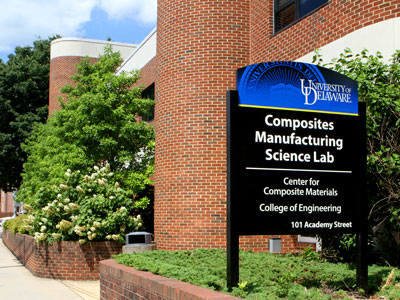Intro to CCM
|
The University of Delaware’s Center for Composite Materials (UD-CCM) has been internationally recognized as a center of excellence for interdisciplinary research, education, and technology transfer in the areas of materials and synthesis, multifunctional materials, processing science, mechanics and design, sensing and control, and software. Since 1986, UD-CCM’s programs and initiatives have been designated Centers of Excellence eight times by the National Science Foundation (NSF) and the Department of Defense (DoD). Founded in 1974, UD-CCM’s mission is to:
|
 |
- Educate Scientists and Engineers. Undergraduate students participate through the University’s Science and Engineering Scholars Program, CCM’s summer internship programs, CCM Senior Research Fellowships, or employment as undergraduate research assistants during the academic year. Graduate students work directly for CCM programs while they take classes. In the past year, more than 57 faculty, 34 research professionals and post-docs and 83 graduate and undergraduate students have been involved in more than 50 CCM research projects and educational activities with annual research expenditures over $14.7 million.
- Transition Technology to Industry. The Centers of Excellence and other funding sources provide significant leverage to our industrial sponsors. Companies of all sizes currently benefit from our commitment to technology transfer, which provides them with new ideas, new technologies, problem-solving capabilities, and access to potential employees with the capability to make immediate contributions.
UD-CCM was one of the first centers at the university and is currently one of sixteen research centers in the College of Engineering. UD-CCM attracts faculty and students from the Departments of Chemical Engineering, Materials Science & Engineering, Civil & Environmental Engineering, Electrical & Computer Engineering, and Mechanical Engineering, as well as from the Departments of Mathematics, Physics & Astronomy, and Chemistry & Biochemistry in the College of Arts & Science and from the Accounting & MIS Department within the College of Business & Economics.
Activities at UD-CCM are supported by external sources, including grants, cooperative agreements, contracts, and industrial contracts. Funding sources include the U. S. Army Research Laboratory (ARL), the U. S. Army Tank and Automotive Command (TACOM), the Office of Naval Research (ONR), the Defense Advanced Research Projects Agency (DARPA), the National Science Foundation (NSF), and industrial companies representing materials suppliers, and end users in the aerospace, automotive, civil engineering, and durable goods industries. More than 350 small, medium, and large companies have benefited from affiliation with CCM and received benefits afforded membership in the University-Industry Consortium.
Utilizing 53,688 square feet of state-of-the-art facilities and equipment valued at over $25M, UD-CCM develops models and simulations in a “virtual manufacturing” environment for process optimization and tool design, leading to improved quality, affordability, and innovative new composite manufacturing processes. By controlling the microstructure and molecular architecture of existing and next generation materials, new composites are designed to accomplish multiple performance objectives in a single system. The Center also develops on-line sensors and devices for monitoring composites manufacturing to end-of-life and validates control schemes using simulations and manufacturing work cells.







